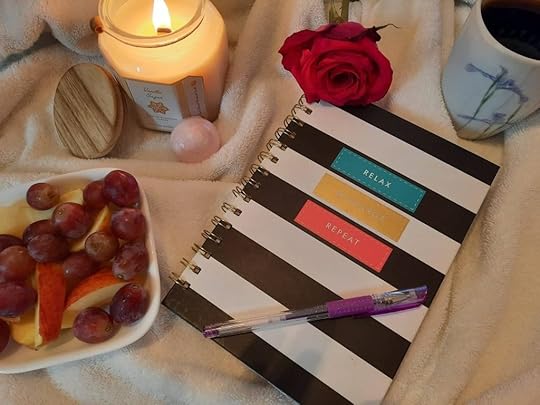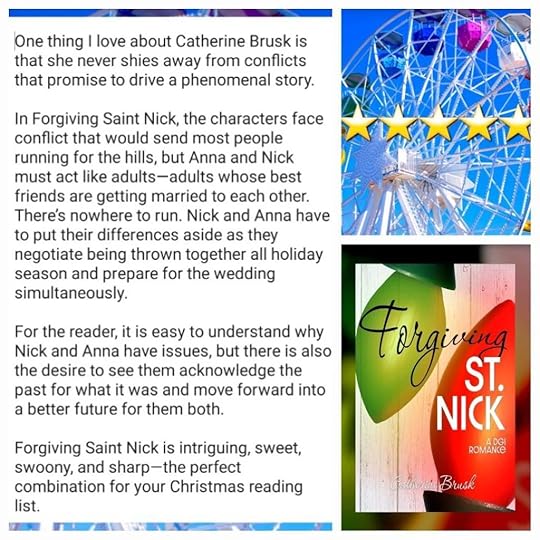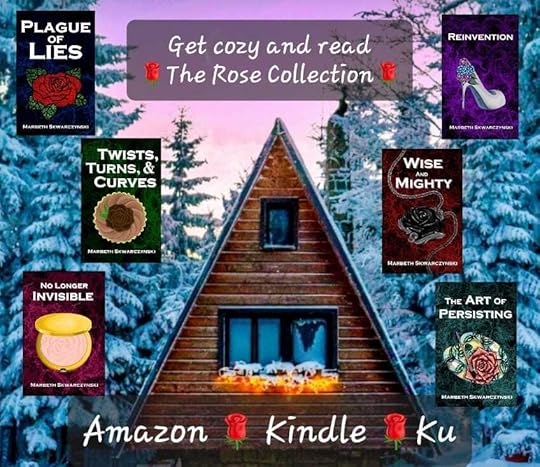Years before I joined Goodreads (or even knew what Goodreads was), I was a book counter.
I would use a journal-type calendar and write the name of the book I’d read and maybe a note about whether I loved or hated it. Then, I’d put a number next to the title. It was my way of keeping track of how many books I’d completed so far during the year.

When, after several people suggested it to me, I finally joined Goodreads, I discovered that the app had a yearly reading challenge. When you sign up, you quote the number of books you’d like to read throughout the upcoming months, and as you read, they are added to the challenge’s total. For a while, I kept my journals while doing the online record, but eventually, I only did the Goodreads challenge to keep track of my books. https://www.goodreads.com/
But with Goodreads, there was a twist—for me. I took on the extra challenge of writing reviews for nearly every book I read. I say nearly because, among the hundreds of books I’ve read throughout the years, there have been a few where it was kinder for me to say nothing.
It turned out that I enjoyed writing the reviews, although some of my earliest ones were long. When I started sharing reviews online, I discovered that long and passionate reviews for books I loved lost some of their spark if people had to click on several screenshots to read them. I learned to whittle them down to a paragraph or two. Now, I create backgrounds, add star ratings, and the book covers as well. I share my reviews on various social media sites and Amazon and BookBub, tagging authors as I go.

From my first year on Goodreads, I enjoyed the challenge. I excitedly shared my book-reading journey on Facebook and supported my fellow readers, congratulating them when they reached their goals.
However, some in the social media community found the Goodreads challenge and ANY attempt to “keep track” or “count” books extremely offensive. And they made their views known.
Some couched their disapproval in question form.
“Why are you trying to make reading a competition? Just enjoy it!”
“What is the deal with people bragging about all the books they’ve read? Why can’t they just read for the love of reading?”
Others stated their displeasure outright.
“It is so sad that people COUNT the books they read! Where is the joy in that?”
“I’m not setting the Goodreads Challenge trap for myself. Whatever I read, I read!”
“I don’t want to hear how MANY books you’ve read! Just stop it! I want to know what books you’ve ENJOYED!”
It’s a weird little war of words (of books?), and many arguments against reading goals make some strange assumptions. Counters understand that people can count the books they read AND enjoy them. They can have a goal AND have fun. They can complete a challenge AND love reading.
One of the things I’ve noticed is that the book counters are focused on their reading goals. If they comment on someone else’s, it’s complimentary and encouraging. I’ve never read a post where a book counter suggested that anyone who didn’t count is somehow “less than.” I’ve never read a post where a book counter boldly announced that anyone who didn’t count wasn’t a “real” reader.
Those adamantly against counting have somehow gotten the impression that the counters are trying to push them into a mold and force them into a competition they don’t want to be in. But the anti-counters are defending themselves against a group that isn’t trying to be offensive.
Book counters aren’t worried about anyone else’s reading habits. They aren’t demanding that anyone follow the same goals they’ve set for themselves. They are focused on what THEY are reading and aren’t thinking about anyone else’s reading strategies.
As for the big question anti-counters have, WHY do we count? I won’t speak for others here, but I have reasons for using this strategy.
I like having a goal—when I finish a book, I not only get pleasure and joy from the reading itself, but I also have a sense of completion. It feels good.I’m reminded to write reviews. One of the things I like the most about Goodreads is that it prompts the user to leave a review and a rating. These tools are vital to writers, and I want to offer whatever help I can to them and their future readers.I’m less likely to stick with a book I don’t enjoy—this is new for me. When I taught, I would push myself to read books that might be considered “classics,” “important,” or even “award-winning” precisely because I needed to be aware of them. Now that I’m writing full-time, I can adjust my reading to my personal tastes, so unless I’ve offered to read and write a review as part of a promotional team, I only read what I enjoy. If I don’t like the book or decide it just isn’t for me, I’ll stop and pick up a new one.I’m encouraged to actively seek out new books and authors—having a goal of X number of books means that books must be chosen. This year alone, I’ve discovered a half-dozen new-to-me authors whose talent makes me want to read everything they’ve written.I’m reminded to read—I have many things that vie for my attention. After writing all day, I might find it easier to watch a movie or television show (and I do) and ignore the books I’m currently reading. Having a goal nudges me to pick up the hardcopy book on my nightstand or open an ebook on my phone during television commercials. It reminds me to turn on my audiobook when cooking, folding laundry, or creating an ad for my novels.I’m less likely to fall into a “book hole”— probably one of the most frustrating things for a reader. The last time I fell deep into the abyss of a book hole, I was reading one of those “award-winning” books I mentioned earlier. It took so much time and effort to slog through that I didn’t want to expend my energy on other stories. When that monster of a book was finished, I didn’t want to read again for over a year. It was horrible. I couldn’t get into anything. I took a break from the Goodreads Challenge and let myself go blank. But the following year, I signed up for the challenge again—with a meager number of books as my goal—and slowly got back into reading. That’s also when I stopped reading books I hated. My “Did Not Finish” pile got quite large this year—but my new authors and favorite books pile got even bigger. I’ve used the Goodreads Competition to seek out books I love.Other “counters” might have different reasons for participating in the challenge, but it doesn’t matter. They are using a strategy that works for them. If they are excited about their goals and post about how many books they’ve read, give them a virtual pat on the back and tell them congratulations.
Or, if you find their excitement over achieving a goal offensive, please scroll past the post without leaving any negative comments and continue to read your books in a way that serves you best. It could be that maybe—just maybe—that post wasn’t meant for you.

 newest »
newest »
 newest »
newest »
 I agree with you, 100%, Marbeth. A reading goal can be a positive thing, leading to growth and enjoyment. I set an achievable reading goal of 52 books. But I ended up taking a part time job this year that made the goal more challenging than I imagined. But, I made it! I also joined the 52 Book Club Challenge, that has 52 prompts, to make sure I don't get in a reading rut. It forces me to try new genres and authors. I understand why people feeling rebellious toward setting a reading goal. We have all had to read depressing or boring novels in school that we hated. But, having recently spoken to a very rebellious and unsaved family member, who is living in squalor because of her rebellions and choices, I see the spiritual dichotomy between some "rebels" and people like you and me. (I am not saying those who want to mood read and follow their whims are wrong. I did that for many years while working long hours with a long commute. I am saying that some people have an angry "don't tell me what to do" complex that affects them detrimentally in ways they probably don't realize or would never admit. They are missing out on growth opportunities and they don't even know it.)
I agree with you, 100%, Marbeth. A reading goal can be a positive thing, leading to growth and enjoyment. I set an achievable reading goal of 52 books. But I ended up taking a part time job this year that made the goal more challenging than I imagined. But, I made it! I also joined the 52 Book Club Challenge, that has 52 prompts, to make sure I don't get in a reading rut. It forces me to try new genres and authors. I understand why people feeling rebellious toward setting a reading goal. We have all had to read depressing or boring novels in school that we hated. But, having recently spoken to a very rebellious and unsaved family member, who is living in squalor because of her rebellions and choices, I see the spiritual dichotomy between some "rebels" and people like you and me. (I am not saying those who want to mood read and follow their whims are wrong. I did that for many years while working long hours with a long commute. I am saying that some people have an angry "don't tell me what to do" complex that affects them detrimentally in ways they probably don't realize or would never admit. They are missing out on growth opportunities and they don't even know it.)






